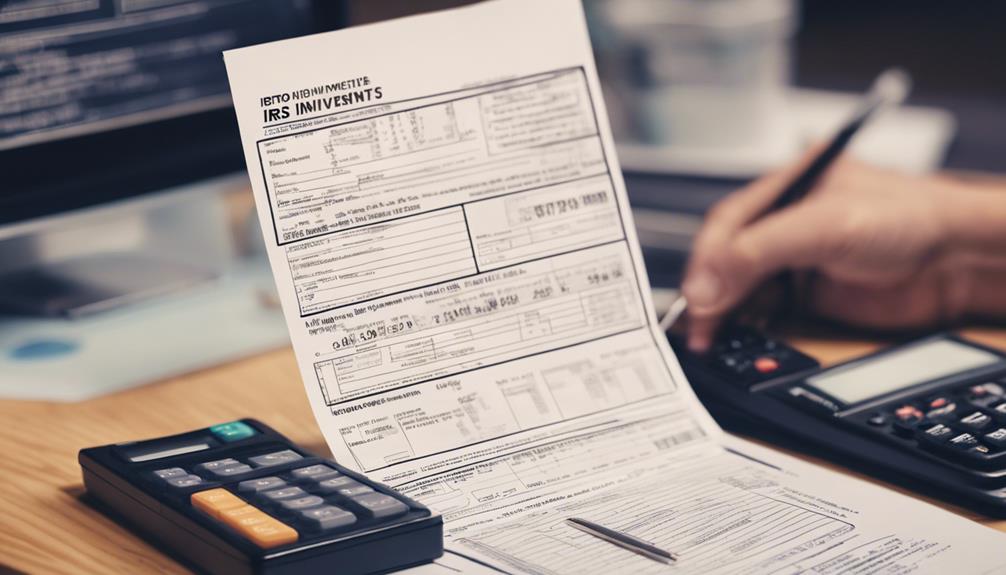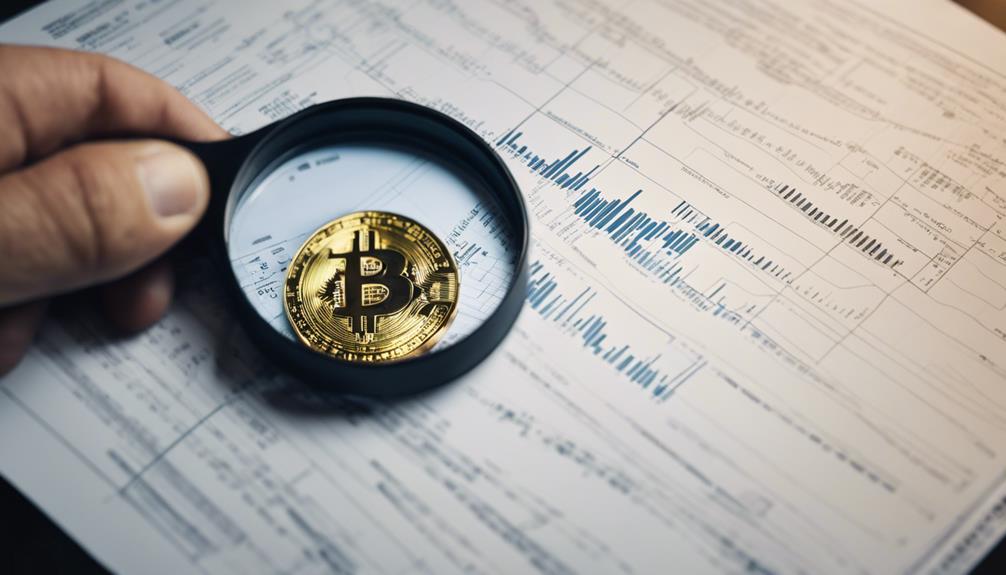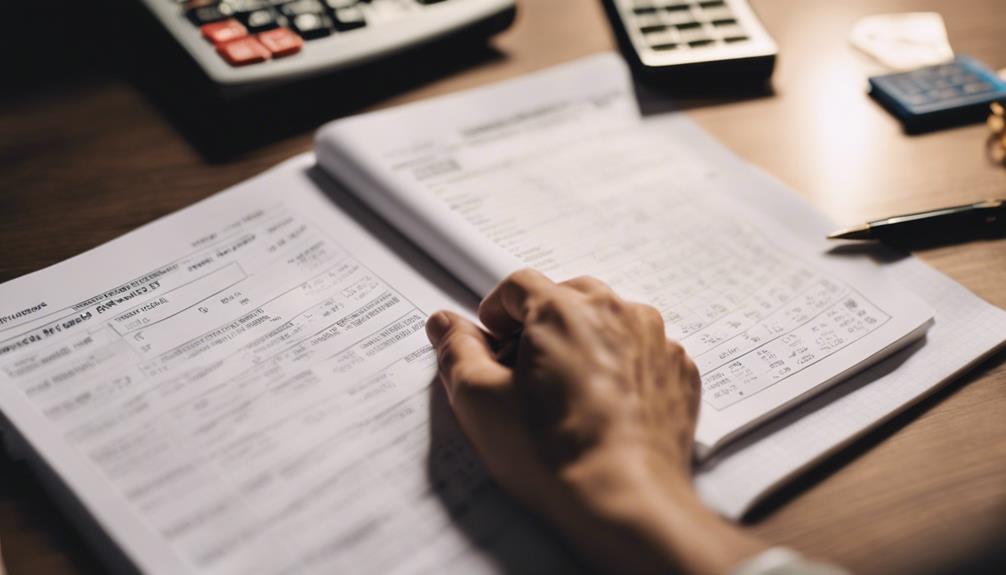When you decide to invest in a Bitcoin IRA, it is important to adhere to 10 essential rules for a successful outcome. Contribution limits stand at $7,000 for individuals under 50 years old and $8,000 for those who are 50 and older, offering tax-deductible options for both Traditional and Roth Bitcoin IRAs. It is advisable to choose reputable custodians who comply with IRS regulations, ensuring the protection of assets and a diverse range of cryptocurrency investments. To minimize risks, consider diversifying across different sectors and investing in long-term growth assets such as well-established cryptocurrencies. Maintain a balanced portfolio by establishing target allocations and conducting regular reviews. Enhance security by utilizing offline storage and encryption methods. Check for compliance and consult with financial professionals to align your strategy with your financial objectives and tax considerations. By following these guidelines, you can develop a strong Bitcoin IRA strategy.
Key Takeaways
- Adhere to contribution limits based on age and IRA type.
- Ensure tax compliance with capital gains reporting and income tax considerations.
- Select a reputable custodian for transaction oversight.
- Diversify assets for risk management and long-term growth potential.
- Implement rebalancing strategies to optimize returns and mitigate losses.
Contribution Limits

When investing in a Bitcoin IRA, it's important to be aware of the contribution limits to make informed decisions for maximizing potential growth and tax benefits. For 2024, the contribution limits for Bitcoin IRAs are set at $7,000 for individuals under 50 years old. However, investors aged 50 and older have the opportunity to contribute up to $8,000 to their Bitcoin IRAs during the same year.
It's worth noting that these contribution limits apply to both Traditional and Roth Bitcoin IRAs. Additionally, contributions made to Bitcoin IRAs may be tax-deductible, contingent on the type of IRA and individual circumstances. Understanding and adhering to these contribution limits are vital for investors looking to optimize the tax benefits and growth potential of their Bitcoin IRAs.
Tax Implications

When contemplating a Bitcoin IRA, it's important to understand the tax implications that come with it.
Tax filing requirements, tax-deferred growth benefits, and eligibility for tax-free withdrawals are key points to evaluate.
These factors can have a substantial impact on the overall return on investment and should be carefully assessed before making any decisions.
Tax Filing Requirements
Understanding the tax implications of investing in a Bitcoin IRA is essential for fulfilling accurate tax filing requirements. When dealing with tax filing for a Bitcoin IRA, there are specific aspects to take into account:
- Capital Gains Reporting: Properly report any capital gains from selling cryptocurrency within your Bitcoin IRA.
- Income Tax Considerations: Be aware that income tax may apply to activities like airdrops, interest from lending, and mining within your Bitcoin IRA.
- Tax-Free or Tax-Deferred Growth: Grasp the fact that tax-free or tax-deferred growth within a Bitcoin IRA can impact your tax filing requirements.
- Distribution Tax Implications: Understand the tax implications of distributions from your Bitcoin IRA to make sure accurate tax filing.
Tax-Deferred Growth Benefits
Tax-deferred growth benefits in a Bitcoin IRA offer investors the advantage of allowing their investments to grow without immediate tax implications. By deferring taxes on capital gains, individuals can potentially maximize their investment returns over time. This strategy can help investors avoid or delay paying capital gains taxes on their cryptocurrency investments, leading to increased wealth accumulation within the IRA. Additionally, Bitcoin IRAs provide the opportunity for tax-free growth, allowing investors to compound their gains without incurring additional tax liabilities. Utilizing a Bitcoin IRA can be a tax-efficient way to invest in cryptocurrencies and save on taxes in the long run. Below is a table outlining the benefits of tax-deferred growth in a Bitcoin IRA:
| Tax-Deferred Growth Benefits |
|---|
| Maximize Investment Returns |
| Avoid Capital Gains Taxes |
| Tax-Free Growth Potential |
| Tax-Efficient Cryptocurrency Investment |
| Long-Term Wealth Accumulation |
Tax-Free Withdrawals Eligibility
We can explore the eligibility criteria for tax-free withdrawals in a Roth Bitcoin IRA, focusing on the associated tax implications.
- Tax-free withdrawals from a Roth Bitcoin IRA become possible once the account holder reaches age 59½.
- Roth Bitcoin IRAs provide the benefit of tax-free growth potential for qualified distributions.
- Contributions to a Roth Bitcoin IRA are made using after-tax dollars, allowing for tax-free withdrawals later on.
- Qualified distributions from a Roth Bitcoin IRA encompass both the contributed amounts and any earnings accumulated over time.
Understanding these points is essential for maximizing the advantages of a Roth Bitcoin IRA and ensuring compliance with tax regulations for retirement savings.
IRA Custodian Rules

To guarantee compliance with IRS regulations and uphold the tax-advantaged status of an IRA, IRA custodians play a pivotal role in administering and safeguarding IRA assets. These financial institutions are responsible for overseeing transactions, maintaining detailed records, and ensuring proper reporting within the IRA. Since individuals are not allowed to directly hold IRA assets, they must entrust them to an approved custodian. Selecting a reputable and experienced custodian is essential for the security and compliance of a Bitcoin IRA. Below is a table summarizing key aspects of IRA custodian rules:
| Aspect | Description | Importance |
|---|---|---|
| Compliance | Custodians must adhere to IRS regulations to retain the tax-advantaged status of the IRA. | Essential |
| Security | Safeguarding IRA assets against unauthorized access and potential threats is a primary duty of custodians. | Critical |
| Transaction Oversight | Custodians are responsible for monitoring and approving transactions within the IRA to ensure compliance. | Fundamental |
Choosing an IRA custodian diligently is crucial to the long-term success and security of your Bitcoin IRA.
Asset Selection Criteria

When selecting assets for your Bitcoin IRA, it's vital to contemplate diversification for risk management and long-term growth potential.
By including a mix of established and emerging cryptocurrencies, you can mitigate risk and maximize potential returns.
Evaluating factors like historical performance, market capitalization, and regulatory environment helps in making informed decisions for your investment portfolio.
Diversification for Risk Management
How can diversification enhance risk management in a Bitcoin IRA through asset selection criteria?
Diversifying a crypto portfolio within a Bitcoin IRA is important for minimizing risk and maximizing potential returns. To effectively manage risk through asset selection criteria, consider the following:
- Cryptocurrency Mix: Select a variety of cryptocurrencies such as Bitcoin, Ethereum, and other digital assets to spread risk across different sectors of the market.
- Performance Analysis: Evaluate historical performance, market capitalization, and future potential of each crypto asset to make informed investment decisions.
- Risk Balancing: Balance high-risk assets with more stable options to mitigate investment volatility within the Bitcoin IRA.
- Correlation Assessment: Analyze the correlation between different cryptocurrencies to create a diversified portfolio that reduces overall risk exposure.
Long-Term Growth Potential
Considering cryptocurrencies with robust fundamentals and long-term growth potential is essential for optimizing the performance of a Bitcoin IRA. When selecting assets for long-term growth, focus on established cryptocurrencies like Bitcoin and Ethereum with a history of market acceptance and stability.
Diversification across different cryptocurrencies within your IRA can help mitigate risks and maximize growth opportunities over time. Evaluate each asset's technology, team, adoption rate, and regulatory environment to gauge its potential for sustained growth.
Diversification Strategies

To optimize returns and reduce risk in a Bitcoin IRA, diversification involves spreading investments across various cryptocurrencies. This strategy allows for a more balanced portfolio, mitigating the impact of potential losses in any single asset.
Here are four key diversification strategies to contemplate:
- Allocate Across Different Sectors: Distribute investments in stablecoins, DeFi tokens, and blue-chip cryptocurrencies to gain exposure to various segments of the crypto market.
- Regular Portfolio Rebalancing: Periodically review and adjust your portfolio based on market trends and performance to guarantee it remains aligned with your investment goals.
- Utilize Dollar-Cost Averaging: Investing a fixed amount regularly in different cryptocurrencies can help smooth out the effects of market volatility over time.
- Consider Risk Tolerance: Tailor your diversification strategy based on your risk tolerance and investment horizon to create a well-rounded portfolio that suits your financial objectives.
Security Measures

To safeguard our Bitcoin IRA investments, we must prioritize stringent security measures. Implementing offline storage and robust encryption protocols are key components in securing our digital assets. By storing 100% of our investments offline, we greatly reduce the risk of online threats targeting our holdings. Additionally, utilizing encryption protocols, such as SSL secure trading with 256-bit encryption, enhances the security layers protecting our assets. Partnering with BitGo Trust, a reputable US-based Qualified Custodian, guarantees secure offline custody of our investments, further bolstering our protection. Moreover, the incorporation of two-factor authentication adds an extra level of security to our accounts, safeguarding against unauthorized access. By adhering to these security measures diligently, we can mitigate potential risks and safeguard our Bitcoin IRA investments effectively.
| Security Measure | Description | Importance |
|---|---|---|
| Offline Storage | Storing 100% of investments offline to minimize online threats | High |
| Encryption Protocols | Implementing SSL secure trading with 256-bit encryption for enhanced security measures | High |
| Two-Factor Authentication | Adding an extra layer of security through two-factor authentication | Medium |
Rebalancing Techniques

Implementing effective rebalancing techniques is essential for maintaining the ideal allocation of assets in a Bitcoin IRA. When it comes to rebalancing, there are several key strategies to take into account:
- Set Target Allocations: Establish specific percentages for each cryptocurrency held in the IRA to guide the desired distribution of assets.
- Regular Review: Consistently monitor the performance of the different cryptocurrencies in the portfolio to make sure they align with the target allocations.
- Adjustment: Make necessary adjustments to cryptocurrency holdings based on market changes and deviations from the target allocations.
- Optimize Returns: The goal of rebalancing techniques is to optimize returns while effectively managing the risk associated with the assets held in the Bitcoin IRA.
Monitoring Performance

Regularly tracking the value of our Bitcoin IRA allows us to assess its performance over time. By consistently monitoring the fluctuations in our Bitcoin IRA, we can gain valuable insights into how our investment is faring. Reviewing historical data and trends enables us to understand the overall trajectory of our Bitcoin IRA's performance and identify patterns that may influence future outcomes.
Comparing our Bitcoin IRA performance against relevant benchmarks or indices provides a benchmark for evaluating our investment strategy and determining areas for improvement. Analyzing various factors that impact the performance of our Bitcoin IRA, such as market conditions and news, helps us make informed decisions about our investment portfolio.
Utilizing tools like performance reports and portfolio analytics further enhances our ability to evaluate the effectiveness of our investment strategy and make necessary adjustments to optimize our returns. Monitoring performance is integral to maintaining a successful Bitcoin IRA and ensuring our investment aligns with our financial goals.
Regular Compliance Checks

Regular compliance checks involve:
- Monitoring regulatory updates
- Reviewing documentation processes
- Participating in compliance training sessions
These measures are essential for ensuring that Bitcoin IRA investments align with IRS guidelines and custodial rules.
By conducting regular compliance checks, investors can:
- Mitigate potential risks of penalties
- Maintain the tax advantages associated with their cryptocurrency holdings.
Regulatory Updates Monitoring
Staying informed about regulatory updates is crucial for guaranteeing compliance with evolving laws in the cryptocurrency investment sector. To effectively monitor regulatory changes, consider the following:
- Regularly review updates from relevant regulatory authorities.
- Attend industry conferences and webinars to stay informed.
- Engage with legal experts specializing in cryptocurrency regulations.
- Implement robust compliance checks to guarantee adherence to new guidelines.
Documentation Review Process
Our review process for documentation in conducting regular compliance checks plays an important role in ensuring accuracy and adherence to IRS regulations within a Bitcoin IRA.
During compliance checks, various documents such as account statements, transaction records, and tax forms are meticulously scrutinized to verify the proper documentation and reporting of all required information.
These reviews are essential for maintaining transparency and accountability in cryptocurrency investments within a Bitcoin IRA. It's necessary to comply with documentation requirements to avoid potential penalties or legal consequences.
Compliance Training Sessions
Participating in compliance training sessions is essential for educating individuals on cryptocurrency investment rules and regulations. To guarantee adherence to IRS guidelines and reporting requirements for Bitcoin IRAs, regular compliance checks are vital. During these training sessions, important topics such as tax implications, transaction reporting, and record-keeping specific to Bitcoin IRAs are covered in detail.
Compliance training serves to prevent penalties, audits, and legal issues related to cryptocurrency investments. By following investment rules and regulations, individuals can optimize the benefits of their Bitcoin IRAs and steer clear of potential pitfalls. It's imperative to stay informed and up to date with the evolving landscape of cryptocurrency regulations to safeguard one's investments effectively.
Professional Advisory Consideration

Seeking guidance from a financial advisor is essential when considering a Bitcoin IRA to guarantee alignment with financial goals and risk tolerance. Professional advice can help navigate the complexities of self-directed IRAs and cryptocurrency investments within retirement accounts. Working with an advisor provides personalized strategies for managing a Bitcoin IRA and maximizing potential returns. Advisors can assist in understanding the tax implications, regulatory requirements, and investment risks associated with a Bitcoin IRA. Collaborating with a financial expert helps in making informed decisions and staying compliant with IRS regulations regarding cryptocurrency investments in retirement accounts.
| Key Considerations | Benefits of Professional Advisory |
|---|---|
| Financial Goals Alignment | Personalized strategies |
| Risk Tolerance | Maximizing potential returns |
| Tax Implications | Understanding regulatory requirements |
| Investment Risks | Compliance with IRS regulations |
| Retirement Account Rules | Informed decision-making |
Frequently Asked Questions
How Do I Invest in Bitcoin in an Ira?
To invest in Bitcoin in an IRA, we need to open a self-directed account that allows cryptocurrency investments. We consider tax advantages like potential tax-free growth or deferral.
Evaluating IRA providers supporting Bitcoin investments is vital for secure storage solutions. Diversifying our IRA portfolio with Bitcoin and traditional assets can lead to long-term growth.
Compliance with IRS regulations and custodial rules is essential for a successful investment strategy.
Can I Withdraw Bitcoin From Bitcoin Ira?
Yes, we can withdraw Bitcoin from a Bitcoin IRA, but it must adhere to IRS regulations. Insufficient compliance may incur taxes and penalties. Proper documentation is vital.
Early withdrawals before age 59½ might result in penalties unless for specific exemptions. Consult with a financial advisor or tax professional for guidance to minimize tax implications and guarantee compliance when making withdrawals from a Bitcoin IRA.
Is It a Good Idea to Have a Bitcoin Ira?
Having a Bitcoin IRA can be a good idea for diversifying your retirement portfolio and potentially benefiting from the crypto market's returns. It offers tax advantages and simplifies tax obligations when dealing with cryptocurrencies.
Consulting a financial advisor can help determine if a Bitcoin IRA aligns with your retirement goals. Consider its benefits and risks carefully before deciding.
What Is the Minimum Deposit for a Bitcoin Ira?
The minimum deposit for a Bitcoin IRA can vary, with some providers asking for as low as $1,000. However, certain companies may require $5,000 or more. It's important to research providers to find one that fits your budget.
Some offer smaller initial deposits, making Bitcoin IRAs accessible to a wider investor base. Understanding these requirements is key before opening a Bitcoin IRA to make sure you meet the provider's criteria.
Can Bitcoin IRA Investments Follow Traditional IRA Rules?
Investors looking to diversify retirement with Bitcoin IRA might wonder if it can follow traditional IRA rules. While Bitcoin IRAs are self-directed, they do need to comply with IRS regulations. They offer potential benefits, but it’s important to consider the risks and consult a financial advisor before making any decisions.
Conclusion
In the world of Bitcoin IRA investments, following the rules is like piloting a ship through turbulent waters. By adhering to contribution limits, tax implications, asset selection criteria, and diversification strategies, investors can steer their portfolios towards success.
Rebalancing techniques, monitoring performance, and regular compliance checks act as the compass guiding the way. And with professional advisory consideration as the lighthouse in the distance, investors can safely pilot the unpredictable seas of the cryptocurrency market.











